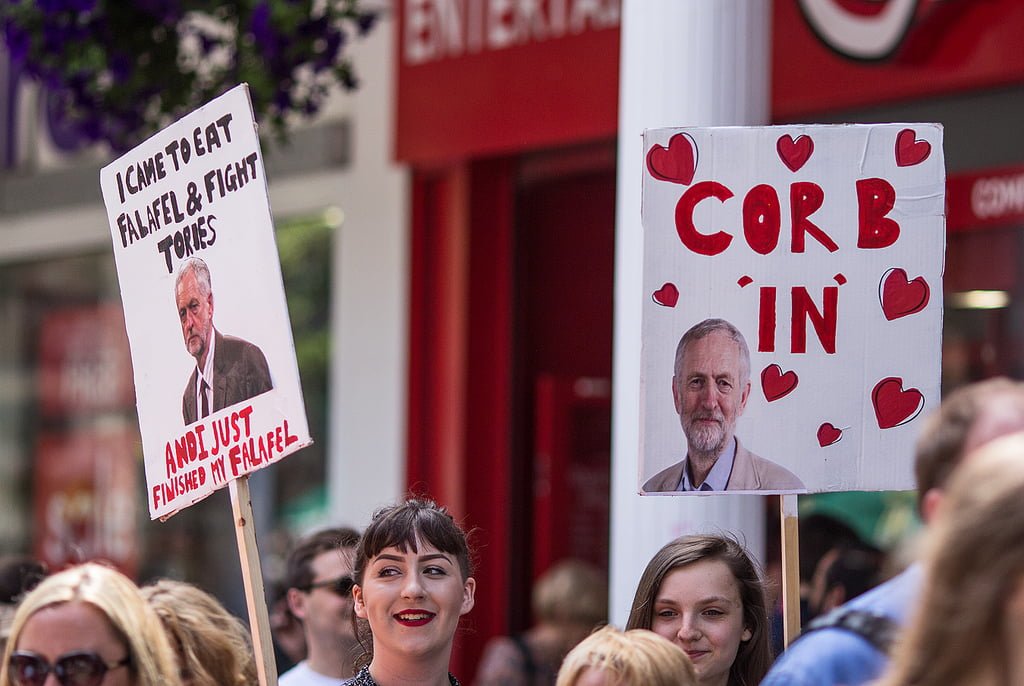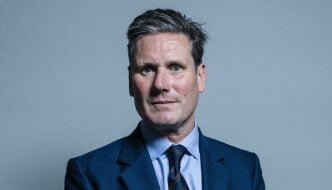
Photo credit: Sophie J Brown
Jeremy Corbyn is accustomed to strong opposition. So when the Labour leader headed North West to Southport on his recent key marginal tour, the howling winds prowling the beach did little to deter his impassioned spirit. Nor did it stand in the way of legions of followers – estimated at 7,000 – lining the coastline to hear him deliver a friendly, yet assertive, reminder that there is much work still to do.
Before a constructed stage, set just to the left of Southport pier, flags and banners of Walton Labour, anti-fracking campaigners, and Muslims for Corbyn tested the restraint of their bearers – such was the force of the gales. At eye level, old and young stood side by side, with sets of both brandishing Nike-like t-shirts stamped with ‘Corbyn’ below the iconic swoosh: this summer’s must-have political-streetwear garment, it seems.
As the sun bedded down in the Irish Sea, all attentions fixed on the horizon. The blustery soapbox was in place. All that was missing was the Labour leader.
In the eyes of supporters congregated in Southport, June’s General Election result left Labour on a high. By failing to be swept up in a Conservative landslide victory, the party has transformed overall defeat into a springboard that places Corbyn ahead of Theresa may in opinion polls (averaging out at 42% to 40%). Therefore, embarking on a key marginal tour in the midst of summer shows there is intent. Intent to force another snap election. With Corbyn transitioned from failure to favourite, he’d be right to believe his own hype. Not that his humble demeanour would ever allow such.

Appearing in Southport was significant. The seaside seat was recently won by The Conservatives, having been in the hands of the Liberal Democrat’s John Pugh for 16 years. Without Labour’s failure to roll over, which consequently delivered a hung parliament patched up by the DUP, it is unlikely Corbyn will have shown the guile to rally support in fresh blue territory. Southport is the missing piece for Labour’s Merseyside conquest, and it’s easily in reach.
The constituency is all that evaded a Merseyside clean sweep for the red rose on 8 June. In taking to the town’s beach less than three months on from the election, complete with the reinforced bellow of John Prescott and Liverpool Metro Mayor Steve Rotherham, Corbyn demonstrated it is he who is on the offensive – not Theresa. Southport is just one of many seats across the country where Labour are spying gains.
Fashionably late to his own party, the crowds were left to be buoyed by tracks blared out of the PA. The White Stripes’ Seven Nation Army did much to rouse the spirits and ignite and impromptu singalong of “oh – Jeremy Corbyn”, but the real unifier was imminent.
Steve Rotherham took lead of the proceedings. The Metro Mayor thanked the crowd for their turnout, before former deputy PM John Prescott delivered a speech of emboldened red. To follow, the microphone was passed on to who he described as “the next Prime Minister of our country: Jeremy Corbyn.”
The adulation for Corbyn has not wavered since the election result. If anything, there is now a sincere confidence in each cheer that erupts from his supporters, rather than one of blind hope. Corbyn, too, seems to have raised his game. The 68 year old had borrowed much from his election notes, however, they were spoken with a new found determination. “For The Many” is no longer just campaign rhetoric. The simplicity of the phrase has galvanised a dormant left, and called to arms even those too young to fight. However, 2022 will be in their sight, should Corbyn remain leader until the next scheduled election – providing another rush to the polls isn’t provoked.

With the microphone in hand, Corbyn assured the crowd that it is only a Labour government that will save the NHS. The same goes for the deteriorating state of education, and much ridiculed zero hour contracts – though there was little mention of the promise to wipe existing student debt, which has since been reneged on.
An adept orator, the Labour leader drenched every statement in ambition – an ambition that has already risen party membership to record heights, and scored a higher national vote share than Ed Miliband in 2015. “I don’t want to live in foodbank Britain”, was one of a number of stirring soundbites to cut through the winds and echo off the sea walls.
The next leap for Corbyn is to seriously challenge for the keys to Number 10. Brexit, however, threatens to ruin the party. Without the complications of the EU divorce, and the awkward line Labour is straddling in regards to accepting the referendum outcome, Corbyn would undoubtedly be front runner to be next PM. For now, he has to make do with fighting The Tories, austerity and xenophobia on the beaches. If his appearance in Southport is anything to go by, he’s certainly up for it.




Comments